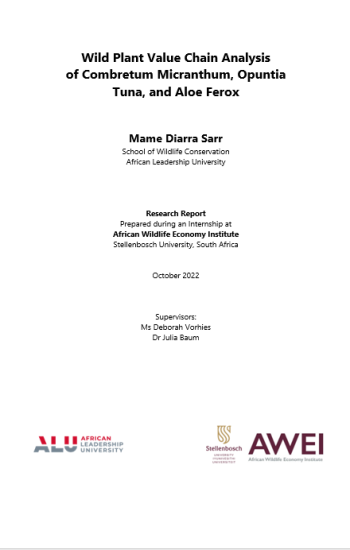
Wild Plant Value Chain Analysis of Combretum Micranthum, Opuntia Tuna, and Aloe Ferox
The African flora is one of the richest in the world with 68,000 plant species, and the West African region and South Africa are positioned in a very strategic position in that biodiversity richness. With the interesting selection of plants, the objective of this research report is to explore ways through which sustainable harvesting and valorisation of wild plants through commercialization and possible monetization of provided ecosystem services can contribute to a range of SDG outcomes in the African continent and worldwide.
Sarr, Mame Diarra. (2022). Wild Plant Value Chain Analysis of Combretum Micranthum, Opuntia Tuna, and Aloe Ferox. African Wildlife Economy Institute, Stellenbosch University.
-

Ms Mame Diarra Sarr
Intern (2022)
We support the free flow of information. Please share:
More content
-

What Foot and Mouth Disease-free means for South Africa’s game meat trade
Ms Lydia Daring Bhebe…Explore the latest developments in South African provinces achieving and maintaining Foot and Mouth Disease (FMD) free status…
Articles -

The world wildlife trade regulator is 50 – here’s what has worked and what needs to change
Daniel Challender…Most countries implement Cites, the Convention on International Trade in Endangered Species of Wild Fauna and Flora as…Articles -

Enabling Sustainable Wildlife Trade
Prof Francis VorhiesEnabling sustainable wildlife trade is a key policy measure for growing Africa's wildlife economy. In this respect, CITES…
Articles -

Has CITES become too complicated to be effective?
Prof Francis VorhiesGovernments agreed to the text of CITES in the 1970s, which is quite straightforward. However, the agreement’s implementation…
Articles -

From poachers to providers: Can Africa's wild meat market save wildlife?
Dr Wiseman NdlovuHave you ever considered how wild meat could be more than just a cultural staple but also a…
Articles -

As a fellow of the African Wildlife Economy Institute (AWEI), I am excited to attend the upcoming 3rd…
Articles -

A theory of change to improve conservation outcomes through CITES
Dr Michael 't Sas-Rolfes…Here we articulate the implied theory of change (ToC) underpinning the design and operation of CITES (Convention on...
2025Research -

Wild Meat Value Chain Integration Systems: Opportunities for Value Chain Formalisation and Scaling in Africa
Dr Wiseman Ndlovu…Establishing a legal, safe and sustainable wild meat sector promises to potentially reduce demand for illegally sourced meat...
2025Research -

AWEI's 2024 Wildlife Economy Dialogue Series
Ms Emily TaylorRediscover 2024: A year of insight and inspiration
In 2024, AWEI proudly hosted three ground-breaking dialogue series in…
Articles
Get updates by email
Through impactful research, stakeholder engagement, and professional development, AWEI is supporting the wildlife economy across Africa. Please subscribe for occasional updates on our work and forthcoming events.
Sign up for a quarterly dose of AWEI insights
In a complex and changing world, AWEI generates strategic ideas, conducts independent analysis on wildlife economies, and collaborates with global scholar-practitioners to provide training and expertise for biodiversity conservation, climate resilience, and inclusive economic opportunities in Africa.
